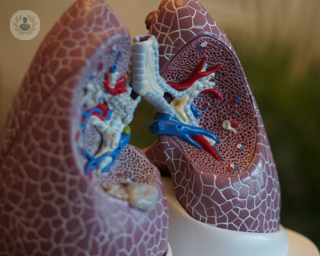What is inflammatory bowel disease (IBD)?
Inflammatory bowel disease (IBD) a medical term used to describe a group of diseases that cause chronic inflammation of the digestive tract.
Our digestive tract is responsible for breaking down food, absorbing nutrients and removing waste products from the body. If any part of the digestive tract gets inflamed, it can disrupt the normal flow of digestion and cause painful symptoms.

The main two types of IBD include:
Inflammatory bowel disease affects both men and women, most commonly between the ages of 20 and 40 years. However, in recent years its incidence has increased in children under 18 years of age.
Symptoms of inflammatory bowel disease
The symptoms vary depending on the severity of the disease and which part of the digestive tract is affected.
Crohn's disease
This can be quite aggressive in its symptoms, which are usually:
- abdominal pain and cramping
- fever
- bloated belly
- diarrhoea, with blood or pus
- fatigue
- reduced appetite
- weight loss
- mouth sores
- fistulas
- bleeding ulcers
- perianal involvement
Ulcerative Colitis
While it presents symptoms similar to Crohn's disease, they are more often milder. It is not that common for the belly to swell and fistulas and ulcers don't usually appear. Symptoms include:
- abdominal pain
- bloated belly
- diarrhoea, with blood or pus
- rectal pain and bleeding
- weight loss
- fatigue
- inability to defecate
Patients with ulcerative colitis will typically experience more intense rectal bleeding or blood loss through the anus.
Inflammatory bowel disease (IBD) is often confused with irritable bowel syndrome (IBS) which although causes similar symptoms, is very different. IBS is a disorder of the lower gastrointestinal (GI) tract, while IBD is inflammation or destruction of the intestines. It is possible to have both IBD and IBS.
Causes of inflammatory bowel disease
The cause of inflammatory bowel disease is unknown, although it is believed that genetics and problems with the immune system play a role. Approximately 20% of those affected by this disease have a direct family member who also suffers from it.
Prevention of inflammatory bowel disease
Since the cause of inflammatory bowel disease is not clear, there are no proven preventive measures to take. Early diagnosis is a good way to slow down symptoms and its progression.
Treatment of inflammatory bowel disease
Inflammatory bowel disease is chronic, so there currently isn’t a cure. Patients with inflammatory bowel disease should visit a gastroenterologist or specialist periodically to monitor the disease and receive appropriate treatment to control the symptoms.
07-28-2014 07-13-2023Inflammatory bowel disease (IBD)
Dr Devinder Bansi - Gastroenterology
Created on: 07-28-2014
Updated on: 07-13-2023
Edited by: Aoife Maguire
What is inflammatory bowel disease (IBD)?
Inflammatory bowel disease (IBD) a medical term used to describe a group of diseases that cause chronic inflammation of the digestive tract.
Our digestive tract is responsible for breaking down food, absorbing nutrients and removing waste products from the body. If any part of the digestive tract gets inflamed, it can disrupt the normal flow of digestion and cause painful symptoms.

The main two types of IBD include:
Inflammatory bowel disease affects both men and women, most commonly between the ages of 20 and 40 years. However, in recent years its incidence has increased in children under 18 years of age.
Symptoms of inflammatory bowel disease
The symptoms vary depending on the severity of the disease and which part of the digestive tract is affected.
Crohn's disease
This can be quite aggressive in its symptoms, which are usually:
- abdominal pain and cramping
- fever
- bloated belly
- diarrhoea, with blood or pus
- fatigue
- reduced appetite
- weight loss
- mouth sores
- fistulas
- bleeding ulcers
- perianal involvement
Ulcerative Colitis
While it presents symptoms similar to Crohn's disease, they are more often milder. It is not that common for the belly to swell and fistulas and ulcers don't usually appear. Symptoms include:
- abdominal pain
- bloated belly
- diarrhoea, with blood or pus
- rectal pain and bleeding
- weight loss
- fatigue
- inability to defecate
Patients with ulcerative colitis will typically experience more intense rectal bleeding or blood loss through the anus.
Inflammatory bowel disease (IBD) is often confused with irritable bowel syndrome (IBS) which although causes similar symptoms, is very different. IBS is a disorder of the lower gastrointestinal (GI) tract, while IBD is inflammation or destruction of the intestines. It is possible to have both IBD and IBS.
Causes of inflammatory bowel disease
The cause of inflammatory bowel disease is unknown, although it is believed that genetics and problems with the immune system play a role. Approximately 20% of those affected by this disease have a direct family member who also suffers from it.
Prevention of inflammatory bowel disease
Since the cause of inflammatory bowel disease is not clear, there are no proven preventive measures to take. Early diagnosis is a good way to slow down symptoms and its progression.
Treatment of inflammatory bowel disease
Inflammatory bowel disease is chronic, so there currently isn’t a cure. Patients with inflammatory bowel disease should visit a gastroenterologist or specialist periodically to monitor the disease and receive appropriate treatment to control the symptoms.


Understanding inflammatory bowel disease: Causes, symptoms, and management
By Professor Naila Arebi
2024-12-04
Here, renowned consultant gastroenterologist, Professor Naila Arebi, explains what inflammatory bowel disease is whilst also telling us how the disease can be effectively managed. See more


SIBO with IBS: symptoms, treatment and diet
By Dr Aathavan Loganayagam
2024-12-04
It may be hard to distinguish between SIBO and IBS as the symptoms are the same. Here, one of London's top gastroenterologists Dr Aathavan Loganayagam explains everything that you need to know about the condition, from diagnosis, diet and diet. See more


IBD: Crohn's disease (CD) vs ulcerative colitis (UC)
By Dr Evangelos Russo
2024-12-04
Of the causes of inflammatory bowel disease, Crohn’s disease and ulcerative colitis are the two most common. Dr Evangelos Russo, an expert gastroenterologist, shares his expertise about these two conditions and clarifies how common they are, their symptoms, how doctors distinguish between the two, which is more serious, as well as the available treatments for both. See more


Understanding bronchiectasis
By Dr Dean Creer
2024-12-04
Bronchiectasis is a chronic respiratory condition characterised by abnormal widening and thickening of the airways (bronchi), which can result in recurrent or persistent chest infections and chronic inflammation of the airways. Leading respiratory medicine specialist Dr Dean Creer provides simple and informative answers to key questions about bronchiectasis for adults who may be affected by this condition. See more
Experts in Inflammatory bowel disease (IBD)
-
Dr Devinder Bansi
GastroenterologyExpert in:
- Colonoscopy
- Gastroscopy
- Indigestion (dyspepsia)
- Inflammatory bowel disease (IBD)
- Liver disease
- Abdominal pain
-
Dr John Martin
GastroenterologyExpert in:
- Colonoscopy
- Capsule endoscopy
- Inflammatory bowel disease (IBD)
- Polypectomy
- Irritable bowel syndrome (IBS)
- Bloated stomach
-
Professor Christos Toumpanakis
GastroenterologyExpert in:
- Neuroendocrine tumours
- Inflammatory bowel disease (IBD)
- Dysphagia
- Coeliac disease
- Acid reflux
- Chronic diarrhoea
-
Dr Aathavan Loganayagam
GastroenterologyExpert in:
- Bowel cancer
- Endoscopy
- Indigestion (dyspepsia)
- Inflammatory bowel disease (IBD)
- Irritable bowel syndrome (IBS)
- Colonoscopy
-
Dr Simon Gabe
GastroenterologyExpert in:
- Short bowel syndrome
- Malnutrition
- Colitis
- Inflammatory bowel disease (IBD)
- Intestinal failure
- Nutrition
- See all

Precision Surgery Group
Precision Surgery Group
King Edward VII's Hospital, 5-10 Beaumont Street, W1G 6AA
No existe teléfono en el centro.
By using the telephone number provided by TOP DOCTORS, you automatically agree to let us use your phone number for statistical and commercial purposes. For further information, read our Privacy Policy
Top Doctors

The Princess Grace Hospital - part of HCA Healthcare
The Princess Grace Hospital - part of HCA Healthcare
The Princess Grace Hospital, 42-52 Nottingham Pl, W1U 5NY
No existe teléfono en el centro.
By using the telephone number provided by TOP DOCTORS, you automatically agree to let us use your phone number for statistical and commercial purposes. For further information, read our Privacy Policy
Top Doctors

The Sloane Hospital - part of Circle Health Group
The Sloane Hospital - part of Circle Health Group
125 Albemarle Rd, Beckenham BR3 5HS
No existe teléfono en el centro.
By using the telephone number provided by TOP DOCTORS, you automatically agree to let us use your phone number for statistical and commercial purposes. For further information, read our Privacy Policy
Top Doctors
-
Precision Surgery Group
King Edward VII's Hospital, 5-10 Beaumont Street, W1G 6AA, Central LondonExpert in:
- Robotic abdominal surgery
- Pelvic floor reconstructive surgery
- Robotic gallbladder surgery
- Robotic cancer surgery
- Robotic colorectal cancer surgery
- Robotic diverticulosis
-
The Princess Grace Hospital - part of HCA Healthcare
The Princess Grace Hospital, 42-52 Nottingham Pl, W1U 5NY, Central LondonExpert in:
- Cancer
- General Surgery
- Orthopaedic surgery
- Robotic Surgery
- Intensive care
- Sports Medicine
-
The Sloane Hospital - part of Circle Health Group
125 Albemarle Rd, Beckenham BR3 5HS , South LondonExpert in:
- Abdominal ultrasound
- Vascular Surgery
- Cardiology
- Colorectal surgery
- Endocrine Surgery
- General Surgery
- See all
- Most viewed diseases, medical tests, and treatments
- Child nutrition
- Migraine
- Paediatric rheumatology
- Autoimmune diseases
- Joint pain
- Nutrition
- Testicular ultrasound
- Breast ultrasound
- Abdominal pain
- Minimal access surgery (keyhole surgery)







